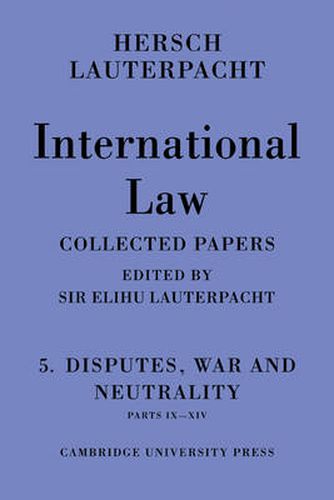Readings Newsletter
Become a Readings Member to make your shopping experience even easier.
Sign in or sign up for free!
You’re not far away from qualifying for FREE standard shipping within Australia
You’ve qualified for FREE standard shipping within Australia
The cart is loading…






Sir Hersch Lauterpacht, formerly of Whewell Professor of International Law at the Univeristy of Cambridge and a Judge of the International Court of Justice, has been generally acknowledged as one of the most distinguished and influential international lawyers of the twentieth century. This is the final volume of his Collected Papers, systematically arranged. It covers ‘Disputes, War and Neutrality’ and comprises such subjects as the settlement of disputes and the structure, jurisdiction and operation of the International Court of Justice, including the important Provisional Report of 1955 on the revision of the Statute of the Court. The Part on the Renunciation of Force includes a draft of a Peace Act (1934) and the Part on the Law of War is introduced by an extended editorial note describing Lauterpacht’s significant contribution to the Law of War, particularly in relation to the prosecution of war criminals.
$9.00 standard shipping within Australia
FREE standard shipping within Australia for orders over $100.00
Express & International shipping calculated at checkout
Sir Hersch Lauterpacht, formerly of Whewell Professor of International Law at the Univeristy of Cambridge and a Judge of the International Court of Justice, has been generally acknowledged as one of the most distinguished and influential international lawyers of the twentieth century. This is the final volume of his Collected Papers, systematically arranged. It covers ‘Disputes, War and Neutrality’ and comprises such subjects as the settlement of disputes and the structure, jurisdiction and operation of the International Court of Justice, including the important Provisional Report of 1955 on the revision of the Statute of the Court. The Part on the Renunciation of Force includes a draft of a Peace Act (1934) and the Part on the Law of War is introduced by an extended editorial note describing Lauterpacht’s significant contribution to the Law of War, particularly in relation to the prosecution of war criminals.